Copyright 2014 Wilhelm Wenger and Carolyn Yeager
Translated from the German by Carlos Whitlock Porter
The following is a neutral account assembled by Willy Wenger describing the situation at the southern portion of the Eastern Front where his brother Oblt. Leopold Wenger was active. The events described here preceded the March to June 1944 letters Willy and his parents received from Poldi, and help to explain them.
The Battle of the Dnieper
From Smolensk to Kherson, that is, from the source to the mouth of the Dneiper, both sides of the river were the scene of a bitter struggle. Stalin had announced the beginning of the Liberation Offensive on 7 October 1943. This was preceded by a reorganization of the Russian armies. The Russian army groups, not including reserves, which were available in abundance, now consisted of 69 armies with 330 divisions, compared to 197 German divisions and a few units of troops allied with Germany. The Germans now had three million soldiers committed to defending the West from the threat of Soviet invasion, in the face of clear Soviet superiority in numbers.
In the South, the Russians claimed their first military victory on 14 October, compelling the 1st German Tank Division to abandon the bridgehead of Zaporizhia. The next day, Soviet infantry divisions and tank brigades went on the offensive between the city of Krementschug and the big bend in the Dneiper River, reaching the major iron-producing center of Kriworog and threatening to encircle the 1st German Tank Division. The Russians now shifted the main thrust of the offensive against the stretch of coastline along the Assowschen Sea. Melitopol fell on 22 October 1943 and reaching the strait of Perekop on 1 November. The 17th German Army entrenched itself in Crimea, while the 6th Army withdrew across the Dneiper and now held only a small bridgehead east of Kherson.
In early November, the Soviets turned their attention to the northern Ukraine. In a change in tactics, Marshal Vatutin withdrew the main part of his armed forces back across the Dneiper, brought them from the southern wing, ferried them back over across the river, and recommenced the attack from the other side. The breakthrough was successful, cutting off the road from Kiev to Shitomir. As a result, Kiev was retaken on 6 November 1943. The majority of German troops nevertheless escaped the encirclement manœuver. On 15 November, German troops succeeded in retaking the city of Shitomir and in restoring the connection to the German front. The German push towards Kiev, on the other hand, was a failure: a sudden early thaw caused the attacking German tanks to sink into the mud, up to the treads and above, putting a sudden end to the German counter-offensive. Kiev remained in Russian hands, but the general situation as regards the German armed forces had improved. In late 1943, the German armed forces were still in possession of large parts of the Dneiper river banks and the major manganese and iron ore deposits of Nikopol and Kriwoj-Rog.
From the Dneiper to the Dniester
Withdrawal into the Ukraine, the Encirclement of Cherkassy
The pause in the Soviet offensive achieved through the Kiev counteroffensive, was of short duration. Marshal Vatutin resumed the offensive around Christmas time. The Russian offensive came from both sides of the Kiev-Shitomir military field railway, which had already been retaken by the Russians on 1 January 1944.
The Russian offensive units were not exactly in great shape. The so-called guard units and mechanized troops were just as aggressive as ever, but most of the Soviet divisions were, to say the least, most unusual. According to reports from the 1st Tank Division, half of the Soviet soldiers captured by them were under the age of 18, and in some cases as young as 13; there were even reports of Russian women’s battalions charging the German lines in frontal attacks. They were described as a huge horde of badly trained, or completely untrained, amateurs, hardly even equipped with uniforms. Of the one thousand prisoners brought in by the German army corps, fewer than twenty were even equipped with weapons, and over half didn’t even have any shoes. Whenever these untrained mobs ran into a German unit that was still halfway intact, they suffered huge, inconceivable, casualty rates. But they were always followed by even more, like the waves of the sea.
The rapidity with which the Russians advanced reminded the Germans of the Blitzkrieg of 1940 in France, 30 to 40 kilometers per day. The offensive expanded in the shape of a fan, driving forward with unparalleled boldness. The southern edge of the wedge overran Berdichev and marched towards the Bug. The German counteroffensive with two army corps reached the Russian lines just as two other wedges were already threatening Vinnytsa and Uman. The most astonishing thing was that the Soviet forces were in no way exhausted.
Although the German army had lost the greater part of the Dnieper line, it still held fast to the region of Cherkassy, in a pocket 50 kilometers wide along the river. From Kirovohrad and Krivoy Rog, the Front formed a deep arc, meeting the river again at Zaporizhia, after which it ran back over onto the eastern bank of the river, forming a front in the shape of an arc, protecting the nickel mines of Nikopol. Further to the south, the front jumped back over the river and followed the course of the river to its outlet at Kherson. According to Hitler‘s orders, this confusing, dangerous line was to be held at all costs. This task was assigned to three armies operating jointly. The southernmost, the 6th Army, covered Nikopol; the northernmost, the 1st Tank Army, kept in loose contact with the 4th Tank Army. The two armies formed a type of pocket, the extent of which extended to the Dneiper, with the 8th Army standing in the middle. Just as Hitler had not wished to lose Stalingrad, he now wanted to hold the Dnieper and Cherkassy.
The capture of Kirovohrad by the Russians in early January 1944 made the German situation even worse. The frontal advance was now over 400 kilometers wide. The casualties among German troops were devastating, enormously reducing their fighting effectiveness as a result of constant fighting. For example, one German tank regiment now consisted of no more than 7 tanks, 4 assault guns, reflecting the strength of a single company. Grenadier regiments with a nominal strength of 1100 men now consisted of no more than 500. The individual divisions defended sections of front from 18 to 25 kilometers in length with only 3,000 soldiers. But any straightening of the front was prohibited without Hitler’s express consent.
On 25 January 1944, the 1st and 2nd Ukrainian Front combined their forces on both sides of the frontal advance, thus encircling two German army groups. The commanders of the encircled troops were ordered to defend the entire length of the pocket. The two army groups were to be supplied through the air field at Korsun; they were to be relieved through a large-scale military operation involving 8 tank divisions, in a war of attrition. But operations proved far more difficult on the ground than on a map. The concentration of tank divisions ran into the utmost difficulties. By day, the ground thawed, causing the vehicles to bog down in a bottomless morass; at night, it froze again, holding the sunken vehicles fast in the frozen mud, which was as hard as stone. On 3 February 1944, only a fraction of the anticipated units had reached their intended destination. But it was no longer possible to put off the attack. The troops inside the encirclement were exhausted. The principal necessities could be provided by airlift to the airfield of Korsun, but the airfield itself was already under threat. The two German tank divisions spent ten days attempting to break through to their encircled comrades. The tank corps attacking from the right were compelled to abandon the attempt thirty kilometers away from their encircled comrades. The tank corps attacking from the left got to within thirty kilometers of the encirclement, but was also brought to a standstill. The commander of the encircled forces, General Stemmemann, disobeyed Hitler‘s orders, withdrew from the Dnieper and moved his forces westwards, where relief was expected. But his men were already dying of hunger; ammunition supplies were as good as exhausted. The Russians called upon the German units to surrender. The encircled forces didn’t answer, but they were at the end of their tether. The encircled forces were crammed together in three quarters of the original area; the airfield of Korsun was lost.
On the evening of 17 February, German guns fired their last shell. The remaining able-bodied men formed two columns behind the last tanks. The night was dark and the night frost had solidified the mud into a weight-bearing mass. The breakthrough was achieved using side arms only. The Russians were completely surprised by the sudden desperate German attack. But the Germans broke through, although there was such great confusion that the survivors were hardly able to describe what happened. General Stemmermann died during the fighting. But 30 – 50 thousand encircled German soldiers succeeded in breaking through to the 3rd Tank Corps.
The battle of Cherkassy enabled the Soviets to isolate the German armies deployed in the southern part of the country, pushing them to the Black Sea and destroying them there. From the mouth of the Dnieper to the Carpathian Mountains, four Soviet fronts formed a half-moon around two German army groups. The 1st Ukrainian front facing the south, the 4th Tank Group, the 2nd and 3rd put constant pressure on the German 8th army, which was already bleeding to death, while the fourth front cut off escape to the Crimea.
The battle of Cherkassy was not even finished yet when the German 6th Army was defeated; Nikopol, which had cost such sacrifices, was captured by the Soviets on 8 February. The German 24th Tank Division encircled in the Cherkassy pocket was redirected southwards, but, as a result of the early thaw, which softened the terrain, arrived too late to save the nickel-producing city. The iron-producing city of Krivoy Rogwar was also lost, being captured on 22 February following the Russian breakthrough in the German lines at Apostolowo. Turning southwards, the advancing Soviets then pushed the German 6th Army against the Dnieper in the region of Kherson. It was able to extricate itself with great difficulty, fighting on two parallel watercourses, the Ingulez and the Ingul, but did not succeed in stabilizing the front. Irresistibly, the Soviets were now approaching Odessa, where 10,000 partisans had taken refuge in the huge underground sewer system.
In the northern Ukraine, a new phase of the struggle was already beginning. Marshall Zhukhov began the offensive on 4 March, in a thrust against Tschernowitz, the capital city of Bukovina, which had belonged to Rumania between 1919 and 1939. Here as well, the Russians broke through, and were already threatening the major Lemberg-Odessa rail line, the only transport link to the Black Sea. The German counter-offensive, with only three tank divisions, was unable to stop the Russians in their attempt to cut off the major rail line at Tarnopol.
The muddy season had started. If the Russians had behaved as they had during the spring of the past two years, operations would have been interrupted for weeks. But this time, they refused to halt, but rather, recovered immediately, in a new offensive, very much to the surprise of the German High Command, who had been counting on the yearly pause for rest in the spring of the year. The withdrawal through the mud, which reached up to the thighs, was a nightmare. The men were able to advance only with indescribable difficulty, constantly fearing encirclement and capture. Naturally, the Russians had great transport difficulties, as well; they were repeatedly compelled to delay their advance and operational objectives due to the exhausted condition of their men. But they were much more mobile than their adversaries, and were also less likely to get lost in the mud, which concealed the roads. Russian transport vehicles were lighter and Russian caterpillar-tread vehicles* were able to move along the very worst roads, and were still effective where the German tanks and tractor-tread vehicles got stuck in the mud.
*During World War II, Caterpillar Tractor Co. made the diesel engines that powered the Sherman (M4) tank. Caterpillar products also found fame with the Seabees, Construction Battalions of the United States Navy, who built airfields and other facilities in the Pacific Theater of Operations. They found their way into Russia too, via the U.S. Lend Lease program.
On 6 March, the 2nd Ukrainian Front threw itself against the German 8th Army and marched against Uman. After capturing the city, the advance continued towards the Bug, which was reached and even crossed on 20 March. Once again, Zhukov went on the offensive, overrunning the German 4th Tank Division, crossing the Dneiper and capturing Tschernowitz on 24 March. The extent of the territory captured by the 1st and 2nd Ukrainian Fronts in 3 weeks now amounted to over 200 kilometer. But what was even worse: the 1st German Tank Army was now encircled.
* * *
Poldi, as he stated in his letter of 23 February, was very proud to have assisted the troops caught in the Cherkassy encirclement and was also of the opinion that the operation had been a success. Only some of the courageous, half-starved German soldiers still able to fight broke through the encirclement, while German propaganda portrayed their performance that night as proof of German heroism. But the men, with bitter mockery, said they were astonished to hear of their great victory in the Armed Forces news reports. -WW
1 March 1944: Dear Willy, when I got your beautiful and kind cards and letters among a large quantity of mail a few days ago, I was really astonished to hear that our half-soldier (former anti-aircraft gun assistant) has now become a “working soldier” [member of the Reichs Labor Service]. And when this period of time is over and a thing of the past, then real soldiering will be much more enjoyable for you. In any case I’m glad to hear that you’ve gotten another step forward in your chosen career. I’m really sorry that I couldn’t serve a few months with the RAD, too, since, from what I gather from the tales told by others, this very short time is a valuable experience for everyone. Of course, there are some difficult and hard times, but it’s all just intended to give you a little preliminary practice for real soldiering, during which things that are difficult won’t seem so difficult any more, and in the end you’ll only remember the most beautiful times in the whole experience.
While you’ve been doing your service over there in Silesia, I’ve been doing a lot of traveling. For the moment, I’m in the region around the coast of the Black Sea, I’ve flown a few missions, but mostly ”long stretches.” Besides that, the weather has not been exactly favorable recently. Once again, you sink fast in the ooze and filth, you really can’t imagine what a filthy pig your brother looks like half the time. Today, on a mission in the vicinity of Krivoy Rog I had bad luck again. Just was I was starting up I got a piston seizure, and had to land again right away. Otherwise, I’m doing well and I’m well, it’s just that we get so little mail. I rarely hear anything from Dad. Since Gerhard and Gretl have been in Gleichenberg, Mom has only written once. But I hope to hear something from all of you soon.
7 March 1944: Since the Bolsheviks made their appearance again, there’s been a lot of work for us. It’s just that the weather is not exactly helping us. A lot of things would be different if the weather gods were on our side. During my last few missions, we really had to do a bit of dodging around and had to do a lot of the “flak-dancing”. An officer cadet from our squadron was shot down a few days ago, but we’re hoping he succeeds in finding his way back to us...on foot.
14 March 1944: To keep you from getting the impression that I‘m already dead and buried, I thought I would report to you once again. I wanted to write to you more often, but even if I had time to do so in the evenings, I was so tired that I was unable to get anything off to you. For some time now, the weather has been better and we’ve been able to fly again, so the first missions take off at dawn and they only stop at night. You can easily imagine that we often get weak in the knees. There were days in which I flew six missions. But it’s all necessary because the Kaschubians from the Masurian/Pomeranian area around the Baltic Sea attack our positions in frontal charges with such persistence that you would never have believed it possible.
I’m completely cut off from the world for the moment. There are no cities here for miles around, and we never see any newspapers. Since there’s no electrical light (electricity), we can’t listen to the news either.
Since 12 February, we’ve been taking off from Nikolayev, usually the southern section [im Südabschnitt], in the big bend of the Dnieper, against Soviet bridgeheads on the Dnieper [writes Bibi]. Starting on 11 March, Bibi was transferred to his new, bleak station in Rauchowka.
In his flight logbook, all these combat missions are noted, and very much resemble each other: constant dive-bombing or low-level attacks using bombs, machine guns and cannon against Soviet troops, horse-drawn and motorised vehicles, cavalry, blowing up ammunition trucks, destroying artillery positions, shooting down a Tupolev SB 3 heavy bomber and scoring direct hits against bridges, etc. -WW
15 March 1944: I flew a lot of missions in the past few days and had quite a decent success rate. Two transport planes attempting to resupply a Soviet division that had broken through, were shot down by my squadron. But unfortunately, I wasn’t able to participate, I could only witness it. Combat flying is really the most important thing right now, and I’m sorry I didn’t start with it earlier. I’m looking forward to hearing about your experiences in the Reichs Labor Service. I’m still well and I’m always healthy. My leg has gotten used to a great many things by now, so I’m doing all right and I’m satisfied. Whatever else is happening to us along the Bug river front, you’ll hear from the Armed Forces reports. There’s a lot going on here; you can be sure of that.
23 March 1944: Apart from snappy missions, during which there was usually a lot of iron flying around in the air, very little has changed. I flew my 100th Russian mission yesterday, and got a beautiful 2cm direct hit in my wing panel. You get assigned to combat missions here a lot quicker than you do against England. Everything is swimming in mud again, since it’s rained a little bit. But we’re already used to all that sort of thing around here. They ought to build a cinema, though. But for the moment, we’re far away from all that here. So we spend our free time in other useful employments... namely sleeping.
26 March 1944: At the same time, you write to me, and say you don’t know what to say. Should I write your letters for you? But at the same time, you want me to tell you everything about what I’m doing. – OK, a few days ago, I flew my 200th combat mission. On my last mission, I was able to blow up a munitions vehicle with just a few shots. On my 201st mission, I got into a dogfight with a Soviet two-motor PE2 bomber and shot it down. It crashed and burned right next to a road. Two crew members were captured by our infantry. I was able to observe this from the air. That was my first confirmed "kill."
28 March 1944: Yesterday evening I received your two letters dated the 18th of this month. They were rather a long time getting here. Now I know how things are going in Gleichenberg and what my two siblings are doing. – I feel less edified about your experiences in Leoben with regards to air attacks. It’s only good that nothing more important got blown up and that nobody was killed. I hope you don’t have to go through any more air attacks.
1 April 1944: Where we are concerned, the fighting has gotten a lot tougher in the last few days. It’s unbelievable how the Soviets throw themselves into the struggle, over and over again. I destroyed a plane on the ground yesterday, and today, with my wingman, during an anti-tank fight, I destroyed a Soviet tank, which caught fire and exploded. Those are the most recent events. My very best wishes to you, and please extend my best wishes to our dear Father; best wishes on your birthday, which will be coming up in a few days, and I hope you will be able to celebrate your day of honor many more times, in good health and happy spirits.
3 April 1944: Easter is coming up soon, but around here you wouldn‘t notice it for the moment. After a relatively long period of beautiful, even warm, weather, sometimes, we got a real Arctic-style snow storm that blew up yesterday, like a hurricane, turning a beautiful battleground into a frozen desert. The snow drifts are sometimes so big, that you can’t land or take off in an airplane, and you can’t drive a car either, and horses are the only reliable method of transport left. The Rumanian population is always very friendly and helpful to us. I saw two-humped camels today for the first time; these animals are doing real great service where our grunts and beetlecrushers are concerned. You said you wonder why I’m roving around so much. I’m stationed in the southern sector, and if you look at the map, you’ve got to spend a bit of time in the Black Sea or Bessarabia.
It pleases me to hear what the two little scallywags are getting up to in Gleichenberg. I would be very glad to know how long it will be until Willy is released from his Reichs Labor Service. That he‘s now a Party member was really a big step. I’ve always been very happy about my acceptance into the Party.
When I was fresh out of Aerial Warfare School in 1945, it was repeatedly rammed down our throats how important it is for soldiers to get their rations and mail reliably. Hunger and no news from home are considerably bad for morale. See also Bibi’s answer relating to the mail service. -WW
21 April 1944: Of course, it’s not so long since I last wrote to you, but since I have no idea whether the mail is getting through and whether this will even reach you, I am inclined to write more often, insofar as possible. I usually get "home from work" so late that it’s completely impossible to do anything apart from eating a quick dinner and going to bed. We’ve got to get up so early; and after that, I’ve got to use every minute to get some more sleep, insofar as that’s possible. Just as before, I have no news of what you‘re doing. The last letter I got was dated 16 March. Now we’re all hoping for a big mail bag for once or, better, a whole JU full of mail. That would be the fulfilment of my biggest wish, and the same goes for all of us, because when we get no mail from home it has a noticeable effect on military morale.
Otherwise, it’s going through the roof here. Like everywhere else, the air here in this section of front is full of lead and iron flying around. Over time, the Kaschubians have finally noticed what they’ve got in us [what they face with us] and now they’ve installed an incredible, unbelievable, number of anti-aircraft positions, all over the place. As a result, one of the best pilots in our squadron got shot down by them. But we’ve scored quite a few successes nonetheless.
A few days ago, I was once again able to send Mom a few pictures I took, so Mom’s wish has finally been fulfilled if she gets the aforementioned photos, which were developed by our photographic agency, as per order. Satisfied now?
I’m doing really OK. A few days ago my guts and brain couldn’t take it any more, but after lying down flat for a while, I felt all right again. Otherwise, I’ve got no news to communicate. Have you heard anything from Willy? I would be interested to know what he’s doing and how he feels. Oh well, if the mail ever gets here, which I most fervently hope, hopefully all my questions will be answered.
Since the opening of the large-scale offensive on the Beresina-Bug front, Poldi's 4th squadron was also transferred further north within the framework of the 10th Battle Squadron. The fighter-bombers were also ordered to carry out more frequent fighter missions, particularly, however, and in addition, against American bomber units flying in the Soviet Union under the terms of the American-Soviet Pact and Lend-Lease Agreement, landing there for refuelling. -WW
9 May 1944: Dear Mother: A beautiful Sunday is coming soon, which will also be the Great Day of our Mothers. On that beautiful day, I, too, will be thinking of you and yours most especially and sincerely, and I hope that you will at least be lovingly and happily cared for by our younger sister. I would be glad to send you a bouquet of our magnificent lilacs, which are now beginning to bloom, but that will be impossible.
19 May 1944: I am still in the same section. We visited some other regions further south for just a few days, with a very famous bathing beach (presumably Mamaia). And I was also there during the evacuation of the Crimea, over the water, partly to provide a protective escort for the ships bringing our troops back. That was when I could fly again. Since before that, I was in such bad shape for two weeks that I could hardly gasp for breath. So I had to lie flat for a long time and the doctor didn't even want to let me stand up, but now I'm all right again. I flew a few solid missions in the past few days and had a jolly dogfight back on the front yesterday.
It's gotten really warm here, a bit early. So we changed our winter clothing into our summer suits of blue linen, almost like clothing designed for the tropics. It's also gotten quite comfortable in our village. The blossoms on the trees have already come out and now everything is beautifully green. Our house has a small veranda which is entirely glassed in. We've decked this area out so it's quite relaxing and pleasant now, and it's now our relaxation area. There are wild grapes all over the place, just like in Anger in the old days [My birthplace in Eastern Styria, where my parents lived in 1929 and where Bibi spent his youth -WW]. There's a big stork's nest on the roof and they chatter all day long.
Today I'm sending a couple of photographs of my squadron. I don't have a lot to say about myself; of course, I'm quite well, I feel well and everything is all right.
23 May1944: ...so, that's really funny, the way Mom imagines my furlough. Only, once again, it's not as simple as all that, the idea that you can just take time off whenever you want to. Planning it ahead of time is simply impossible.
In the meantime I just had a nice short little snack. A piece of bread with cooked ham, a couple of radishes, butter and tea form the frugal meal made possible by the organisational talent of my squadron. But once again, I also noticed that doves taste good when properly roasted. As you can see, everything is going very well, just as before.
6 June 1944: Since we had nothing to do again today, although the weather outside is absolutely magnificent, I've once again gotten around to writing to you. Now, I'm always glad to hear that everything is all right where you're concerned, considering the circumstances. Since when I hear about the enemy aircraft incursions over southern Germany, it gives me unbelievably more courage. As long as the alarms keep going off, I can stand everything. I flew a whole load of missions again during the large-scale fighting north of Jassy, and was able to fly my 300th combat mission in May. As a result, I was presented with a bottle of champagne by my commander (Oberstleutnant G. Jakob) and from the squadron, an ashtray made out of the piston of my old plane, as a souvenir. Take good care of yourself!
Unfortunately, we had some trouble. My two oldest pilots have been lost, one after the other. One of them blew up during an emergency landing and the other was forced to eject by parachute, and ended up in Soviet captivity. This kind of bad luck is naturally a big blow to all of us. Yesterday there was an announcement that the long-awaited invasion is now building up, and this fact has naturally triggered a lot of excitement with regards to anticipated events. I must say, that after waiting so long, a heavy stone has fallen from my heart. I am now curious to see whether this turn of events will finally permit me a return appearance in France. You never know. There's already enough to do here.
I saw a couple of funny films in the last few weeks. But it's a shame they're no longer showing any Wochenschau films [military newsreels].
9 June 1944: Dear Mother! On the occasion of your birthday, which will be in a few days, I want to wish you all the imaginable happiness, good luck and excellent health. Please excuse the „fantastically imaginative“ stationery, but I'm stationed at another position at the moment, and I don't have everything with me that I need.
I would also like to congratulate little Gerhard a belated Happy Fifth Birthday. Once again, I hope that everything is going well for him and that he is also enjoying the very best of health.
20 June 1944: I also have enough to do at the moment, even if I'm not really doing a lot of flying. There's not much going on to the front of us in our section. In compensation, however, there has been a significant increase in Soviet aerial activity and they paid us a visit almost every night.
Otherwise I've done a lot of travelling around in Rumania in the past few weeks. Last Sunday, I found myself in a halfway European-looking city again for the first time in six months. We were comfortable there. Just as we were leaving the position, we even stopped at an ice-cream parlor and had a first-rate ice cream with whipped cream. From that place, you'd never notice there was a war going on. Even in the guest houses, you can still get everything to eat, even without stamps. The only thing lacking is the necessary leis [Rumanian currency], since we only receive a small fraction of our salary in Rumanian money, but since we had to return to our collection point and take off on another combat mission at 3 hr. 30 min the next morning, this didn't bother us too much.
Unfortunately, one of my squaddies, a midshipman Oberfähnrich from the anti-aircraft artillery service, was shot down and crashed. So we are having one bit of bad luck after another. Only yesterday, an Oberleutnant from my squadron was wounded in an emergency landing. I hope things get better again soon.
What's new with you? How have people taken the news of the starting [Allied] invasion and the [German rocket] reprisals that were just beginning at the same time? According to guys [coming back from furlough], the morale barometer is supposed to have risen fitfully. The English are getting stupid, it's like looking outside to see if the washing is dry just as your house is catching fire (German V1 rocket attacks). The reports from the invasion front are especially interesting for us, since we already know that whole region in great detail. It's a shame we can't be there anymore. What are they showing you in the newsreels? They must be very interesting. We never get to see them, unfortunately.
I haven't heard anything from Willy for a long time, but I hope that everything is going really well for you and that you are all in the best of health.
27 June 1944: Everything is going well for me, only something really crazy happened on 23 June. Our squadron had our share of being there during a run of back luck. During a mission against bomber units on their way to attack Ploesti and Bucharest, I was taken by surprise by American fighter planes and shot down in flames at 7,500 meters altitude. One of the first bullets grazed my head, shot through my glasses, which were on very tight at the time, and tore through my balaclava without even scratching my scalp. I naturally took a quick nose dive, when the plane started to get hot like a blast furnace. I wanted to bail out, but a lot of pilots have been shot to death recently, just trying to descend by parachute, so I thought better of it and got ready for an emergency landing. And just then one of the Americans decided to score a cheap victory and my plane flew into a thousand pieces and there was less and less plane left, right up to behind my armor plating. In the end, I got away, but my poor plane looked like hell. It looked like a sieve, in fact, and was burning so brightly that I could hardly see anything. I quickly jumped out of the cabin, found a field and seconds later, the plane was lying there on its belly and our battle-hardened Oberleutnant pilot did a quick bunk from the plane, which was getting ready to explode. But it didn't seem to want to explode. It burned peacefully and slowly for quite a few hours yet, and finally went out. So there I lay, lonesome and alone about 55 kilometers from Bucharest.
I withdrew to the nearest village riding on an old farm horse, a real nag, followed by a horde of hollering children, where I was very kindly welcomed and invited in by a very respectable family. I then reached the next German service post in a one-horse-drawn landau, and reached Bucharest the next day, where I was picked up by my squadron. So that was the end of my adventure. Unfortunately, I was informed by my squadron that another man had been killed and a second was reported missing.
The war has gotten harder and more brutal; enemy resistance has gotten tougher, and the number of our own casualties has risen dramatically.
To be continued ... Sevastopol falls and last letters
- Printer-friendly version
- 24531 views




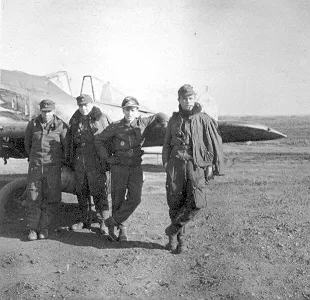
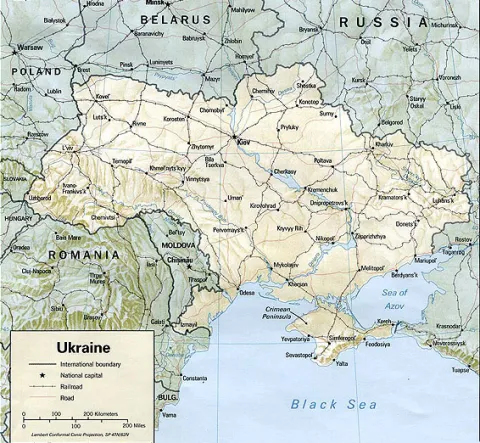
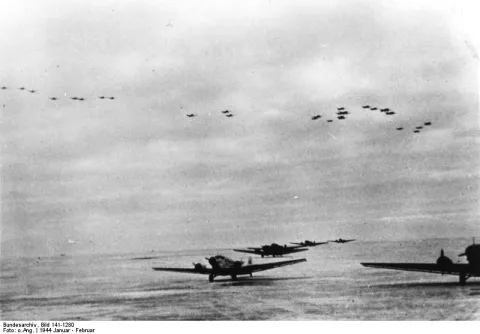
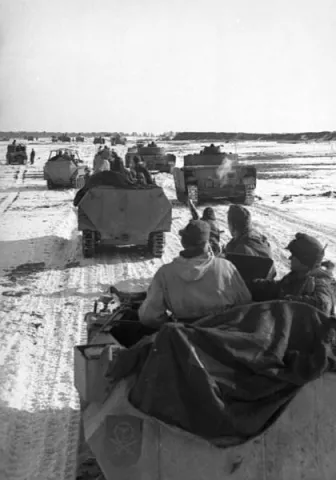

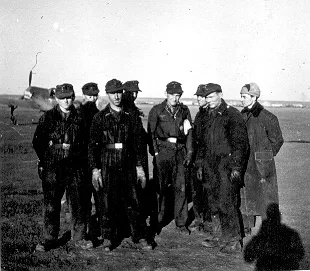
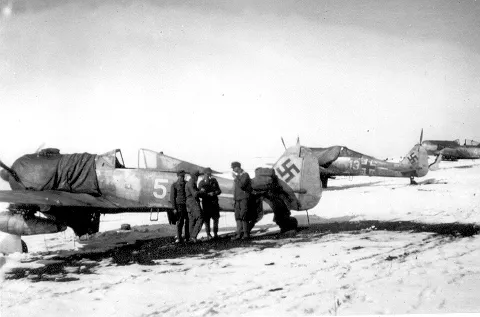
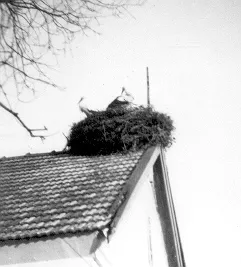
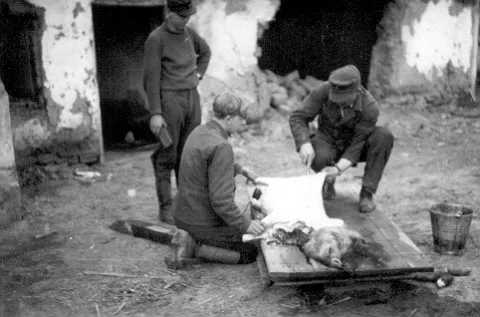
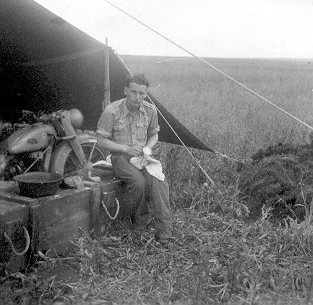

So Leopold saw both fronts.
Markus
So Leopold saw both fronts. Very interesting to read the two different accounts.